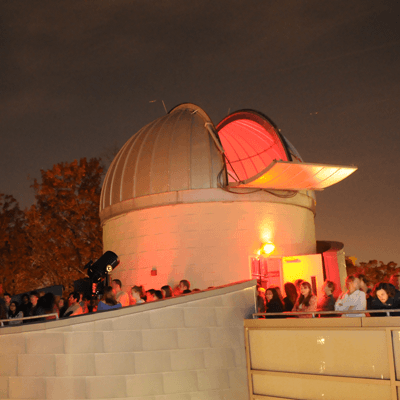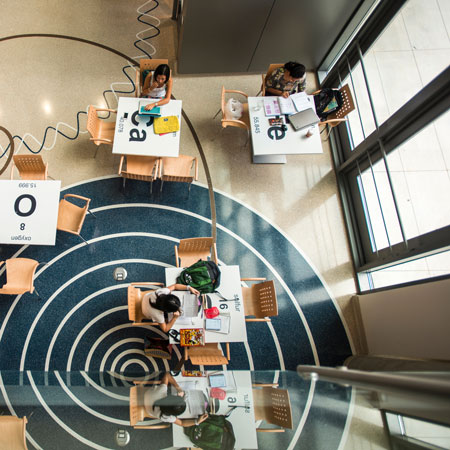Calendar
To submit your event to the College of Science events calendar, use the “post your event” button. Student groups, other Mason units, and external groups with activities related to the College of Science are welcome to submit events for the calendar. If you have any questions or need to edit or delete your event, please email the COS webmaster at cosweb@gmu.edu.
Did you know that you can subscribe to this calendar? If you’d like to be notified of new events and even have them added to your own Outlook or Google calendar automatically, use the “Subscribe” button below the calendar.
COLLOQUIUM ON COMPUTATIONAL SCIENCES AND INFORMATICS
Michael Eichler
Strategic Planning Advisor
Metro Office of Planning
WMATA
Metrorail and Metrobus, Data Sources and Information Needs
Monday, February 12, 4:30-5:45
Exploratory Hall, Room 3301
Abstract: Modernization of nearly all the technology that underlies the provision of rail and bus transit service over the past 30 years has resulted in a vast amount of data that until recently has been more or less neglected. Meanwhile, challenges that face rail and bus transit systems continue to mount, from maintaining a state of good repair to capturing and keeping riders in the age of Uber/Lyft and bike share. The key to providing safe, convenient, affordable, and reliable transit service into the next century lies in the hands of data scientists and policy analysts. This talk will review the different data-generating technologies and the types of data they create, followed by an exploration of the pressing issues faced by transit agencies and the questions begging for answers.
Bio: Michael currently serves as Strategic Planning Advisor at WMATA in the Office of Planning’s Applied Planning Intelligence unit, where he focuses on transforming data into information to help inform policy and planning decisions. He currently focuses on fare policy, crowding, GTFS data and online tools, and customer-focused performance metrics. Before joining WMATA in 2010, he worked for Oracle Corporation, an IT start-up, and the Metropolitan Washington Council of Governments. He holds a BS in Systems Analysis and Engineering from The George Washington University, and masters in City and Regional Planning and Transportation Engineering from UC Berkeley.
Dates for the 2017-18 Academic Year
September 27th
October 10th
October 25th
November 14th [Cancelled]
November 29th
December 12th
January 16th
January 31st
February 13th
February 28th
March 20th
April 3rd
April 18th
May 8th
May 23rd
COMPUTATIONAL SOCIAL SCIENCE FRIDAY SEMINAR
Hilton Root, Professor
Schar School of Policy and Government
George Mason University
Networks and Change in Economic History
Friday, February 16, 3:00 p.m.
Center for Social Complexity Suite
3rd Floor, Research Hall
ABSTRACT: Prof. Root, a frequent visitor to the social complexity seminar, would like to discuss the conceptual framework of his forthcoming book Networks and Change in Economic History. He explores what the great transitions in human social organization share with other complex systems.
To characterize the essential properties of great transitions in history—those that fashion the fundamental institutions for economic growth—the book considers the economy as a network of networks in which the probability of extreme events increases as systems become more interconnected.
The book is divided into three distinct sections. The first advances theory and includes Chapter 1, which discusses the creation of global order; Chapter 2, which addresses the connection of economic history with other sciences, especially with study of complex systems; and Chapter 3, which connects economic history, complexity, and the study of human behavior. It is chapter 2 that he would like to discuss. The key concepts of this section are the juxtapositions, coexistence, and complementarities of order and disorder, and of closed systems within an open universe; the irreversibility of time; and the networked interdependence of different levels of social order. Chapter 2 is attached.
The Table of Contents is below. Interested seminar participants, please contact Prof. Root (hroot2@gmu.edu) for copies of other chapters
Introductory Remarks: Great Transitions in Economic History
Chapter One: Five Transitions and the Formation of Social Order
Chapter Two: Growth, Form, and Self-Organization in the Economy
Chapter Three: Human Evolutionary Behavior and Political Economy
Chapter Four: Network Dynamics of Institutional Formation in Europe and China
Chapter Five: Why the Western Legal Tradition Is Not Replicable (with Cameron Harwick)
Chapter Six: Disruptive Innovation and Networks in World History
Chapter Seven: How China and the U.S. Think Differently About Markets, and Why It Matters for Globalization (with Baocheng Liu)
Chapter Eight: Global Networks Over Time: Where We Are in the History of Globalization (with Kevin Comer, Jack Goldstone and David Masad
Chapter Nine: Will Growing Complexity Bring Diminishing Returns or Massive
Transformation?
Conclusion: Can Western Nations Manage the Transformations Underway?
BIO: Dr. Hilton Root is a policy specialist in international political economy and development, and a member of the faculty at the George Mason University Schar School of Policy and Government. His current research examines three related areas: (1) global power transition and the challenge of legitimacy; (2) the comparative and historical dynamics of state-building; and (3) the use of complexity models to understand the evolution of social institutions.

Join College of Science (COS) students, alumni, faculty and friends as we hear from talented student researchers as they battle for a cash prize!
Prelim slammers also compete for $250 first place and $100 second place awards. The stakes are high as the top slammer in each prelim will move on to compete in the Grand Slam for a $1000 prize. Learn about the research students are engaged in and kick off your weekend with a great night of science entertainment. Heavy appetizers and a few laughs are guaranteed.
As a special feature, the COS Alumni Chapter hosts a meet and greet before the main event from 6:30-7 p.m., where Mason alumni and students can interact and chow down before main the event gets started.
Tickets for the 2nd Prelim of the 2017-18 competition will be available following the previous event.
At Mason, a science slam challenges young scientists to prepare a presentation of fewer than 10 minutes, about their scientific research, for a non-expert audience using any entertaining format they wish. The goal is to solicit the most laughter and applause from the audience though scientific integrity and accuracy are expected and appreciated.
COLLOQUIUM ON COMPUTATIONAL SCIENCES AND INFORMATICS
Sean Mallon, Associate Vice President
Entrepreneurship and Innovation
George Mason University
and
Eric Koefoot
Founder and CEO of PublicRelay
The Journey and Stories of a Data Science Entrepreneur
Monday, February 19, 4:30-5:45
Exploratory Hall, Room 3301
This session will feature conversation between Sean Mallon, Mason’s AVP for Entrepreneurship and Innovation, and Eric Koefoot, founder and CEO of PublicRelay, a venture-backed data analytics and media intelligence startup based in McLean, VA. During the discussion we will explore a wide range of topics, ranging from what inspired the initial business idea, to customer discovery, to product development challenges, to fundraising, to customer acquisition strategies, and much more. This will be a highly interactive seminar and participants are encouraged to come with questions and personal experiences to share.
Sean Mallon, Associate Vice President, Entrepreneurship and Innovation, Office of the Provost. Photo by Ron Aira/Creative Services/George Mason University
Sean Mallon Bio: Sean Mallon is Mason’s Associate Vice President for Entrepreneurship and Innovation. Before joining Mason in 2016, Sean spent many years as an entrepreneur and early-stage technology investor. Sean hold a Bachelor’s in History from Princeton and an MBA from the Wharton School of the University of Pennsylvania.
Eric Koefoot Bio: Formerly the CEO of U.S. News Ventures, CEO at Five Star Alliance, CFO and later VP Global Sales at Washington Post Digital, Eric is the founder and CEO of PublicRelay and brings substantial media experience and understanding. Eric holds a Bachelor’s in Engineering from MIT and an MBA from the Sloan School at MIT.
COMPUTATIONAL SOCIAL SCIENCE FRIDAY SEMINAR
Qing Tian, Assistant Professor
Computational and Data Sciences
George Mason University
Introduction to R for Computational and Data Science
Friday, February 23, 3:00 p.m.
Center for Social Complexity Suite
3rd Floor, Research Hall
ABSTRACT: R is a programming language and free software environment for statistical computing and graphics. It has gained substantially increased popularity in recent years. In addition to classical statistical analysis functionalities, it includes a wide range of packages with capabilities of data mining and machine learning, text analysis, spatial statistics, and social network analysis etc. This seminar will focus mostly on a suite of R packages that are designed to facilitate data (including social networks) visualization. These visualization functions are useful for exploratory analysis of real world data as well as output data from simulations.
Eleanor Sayre
Department of Physics
Kansas State University
Measuring Equitable Participation in Undergraduate Science Classrooms
Abstract
What does it mean for a group of students to be equitable? Why should it matter? I’ll talk through what equity means in undergraduate sciences classrooms, pedagogy for promoting it, and several ways to measure equity in activities and discourse. This is an active talk; come prepared to work with your neighbors.
COLLOQUIUM ON COMPUTATIONAL SCIENCES AND INFORMATICS
Johan Bos-Beijer
Chief Data Officer and Assistant Inspector General
Managed Business Services
U.S. Navy
The Government Data Landscape: Practical Understanding and Perspectives for the Future
Monday, February 26, 4:30-5:45
Exploratory Hall, Room 3301
Mr. Bos-Beijer brings to our forum over 40 years of executive and senior management private and public-sector experience primarily in data, strategic execution, program management, and ever-expanding curiosity about current and future technical capabilities applied to challenges. He is known for sharing successful practitioner examples, formidable development and execution experience, and a unique approach to problems. His presentation and discussion with us will share his personal journey, how to understand the Federal Data Landscape, examples of skills applied to program success and innovation, as well as learning what he refers to as the ‘navigation and negotiation’ approaches to data science in the public sector. He will cover examples of pioneering efforts in government and bringing private sector and academic methods to start ups in government. Mr. Bos-Beijer has also offered additional time with us after the session to interact with students and faculty to further the discussion and networking.
Dates for the 2017-18 Academic Year
September 27th
October 10th
October 25th
November 14th [Cancelled]
November 29th
December 12th
January 16th
January 31st
February 13th
February 28th
March 20th
April 3rd
April 18th
May 8th
May 23rd



